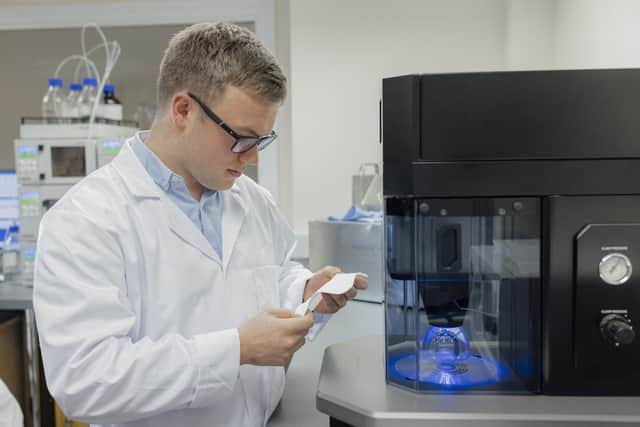Yorkshire firm that helped Bill and Melinda Gates develop eco-friendly mosquito nets invests over £1.2m in new headquarters
The move to new premises will enable Leeds-based NIRI (Nonwovens Innovation and Research Institute) to create 20 new jobs in the city as it looks to expand across Europe.
The University of Leeds spin-out, which works with organisations including the NHS, Ministry of Defence and the Bill and Melinda Gates Foundation, has moved its 40 technical textile scientists from 8,000 sq ft of space on Meanwood Road into over 20,000 sq ft of space at Innovation House on Gibraltar Island Road.
Advertisement
Hide AdAdvertisement
Hide AdIt now has seven laboratories plus office space and meeting rooms.


Speaking to The Yorkshire Post, Chris Fowler, group managing director, said: “We’ve invested in more equipment, more people, bigger and better equipped labs."
He added: “This move will also enable us to expand our advanced materials division, which takes clever chemistry and applies it to the nonwoven fabrics for more commercial applications.”
Mr Fowler said NIRI’s three-year plan is to recruit a further 20 technical textile scientists.
Advertisement
Hide AdAdvertisement
Hide Ad"We have to scour the world to find them,” he said. “Our last recruits have been from Syria, Italy and Zimbabwe and they love Leeds.
"People who come here tend to stay with us. Very few people have left and I think part of that is because Leeds has a lot to offer as a region.”
Mr Fowler said NIRI, which is expected to reach £5m turnover this year, has helped over 350 companies develop over 750 products over the last 17 years.
It now plans to expand and open sites in the US and central Europe.
Advertisement
Hide AdAdvertisement
Hide Ad"We already have small offices in the US and Brazil but they are just representatives of us,” Mr Fowler said. “We want to put facilities there with some of the equipment we have here and replicate that on a smaller scale.”A big focus for the company at the moment is using nonwoven fabrics to make products more environmentally-friendly."Over 90 per cent of our work is in sustainability. Nonwovens can really play a big role in saving the planet by making products more sustainable,” Mr Fowler said.
He added: "We’ve helped many companies reduce their reliance on plastics or meet new regulations and we’ve reduced the environmental impact of many products by improving their biodegradability, compostability, dispersibility, end of life disassembly and creating more of a circular economy.”
Past projects include helping to develop and improve mosquito nets for the Bill and Melinda Gates Foundation.
"Bill Gates called one of our developments ‘super cool’,” Mr Fowler added.
Advertisement
Hide AdAdvertisement
Hide AdNIRI has helped the NHS to produce a universal plasma filtration system that means patients who desperately need transfusions won't have to wait for blood matched plasma.
It has also helped the Ministry of Defence develop ballistic protection for soldiers and worked with some of the world’s leading healthcare companies develop better performing medical products, such as wound dressings.